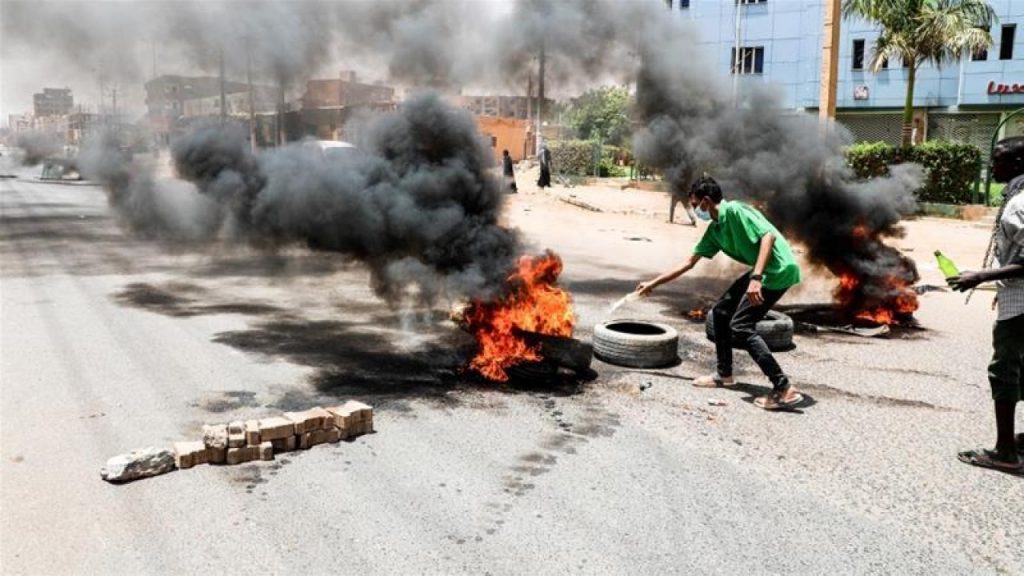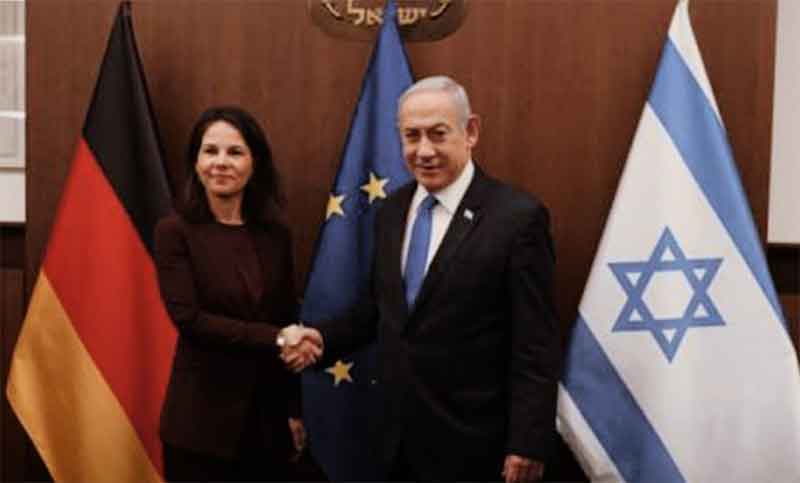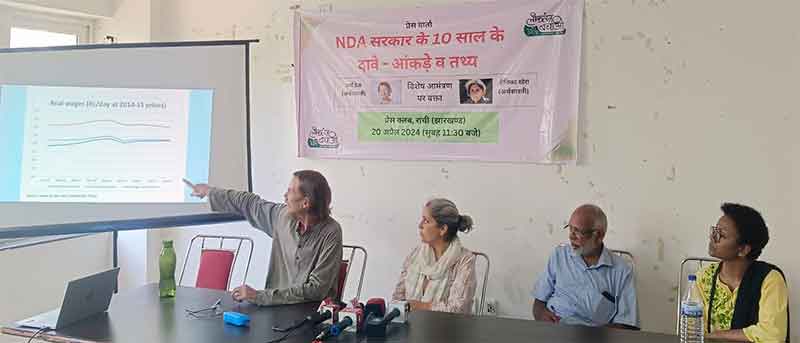
Sudan’s troops stormed the main camp of pro-democracy protestors in the capital Khartoum Monday and killed at least 35 people in a crackdown, which has drawn international condemnation. Hundreds were injured in the armed assault as the Islamists-backed military tried to break up the opposition sit-in, according to the Central Committee of Sudan Doctors, which is close to the protestors. The UN Security Council was expected to hold a closed-door session on Sudan.
Media reports said:
Sudan’s army rulers Tuesday canceled all agreements it had reached with the main opposition coalition and announced elections would be held within nine-months.
General Abdel Fattah al-Burhan, the head of the Transitional Military Council (TMC), said in a statement broadcast on state television early on Tuesday: “The Military Council decides to stop negotiating with the Alliance for Freedom and Change and cancel what had been agreed on and to hold general elections within nine months.”
The military ruler’s announcement comes a day after the military and militias used deadly force to smash a weeks-long sit-in protest outside army headquarters in Khartoum.
Al-Burhan said the TMC would form an interim government to prepare for elections.
However, Al-Burhan did not mention the security forces for breaking up of the democracy-demanding sit-in protest, which saw killing of at least 35 and hundreds of injuries. Instead, Al-Burhan blamed protest leaders for enflaming the situation by “extending the negotiations and seeking to exclude other political and security forces.”
Al-Burhan urged people to show a “spirit of forgiveness.”
Maulana Al-Walid Sayed Ahmed Mahmoud, Attorney General, announced Monday that a committee had been created to investigate the armed assault on demonstrators demanding democracy.
Since ouster of reactionary Omar al-Bashir, the military and security forces have repeatedly shown signs of division and factionalism.
Escalation of Revolution
In response to the military crackdown, the Alliance for Freedom and Change, a coalition of opposition forces that had been negotiating with the TMC, called on Monday for an “escalation of revolution”.
The opposition political alliance announced, “the beginning of an all-out political strike and civil disobedience, and termination of negotiation with the Coup Council (TMC) until it is overthrown.
The Alliance said in a statement: “The Coup Council is no longer fir to negotiate with regarding the future of the Sudanese people.”
It called on the armed forces “to side with the choice of the people in overthrowing the current regime and install a fully civilian government.”
The democracy-demonstrators suspect the military rulers would not hand over power to civilians. Rather the military is trying to create a façade over structure of the old regime.
The military demands a significant share of power in the transition structure leading to election restoring democracy.
Democracy demonstrators’ demand
After the coup, the military council and opposition groups agreed on a three-year transition to democracy.The demonstrators have demanded that the TMC make way for a civilian-led interim body.
Internet blocked
The internet in Sudan is currently more severely restricted than it was during the removal of Bashir, according to monitoring organization Netblocks.
Since Monday, there have been blockages in place across all the country’s major internet providers, although it is not a total outage.
“It appears some effort is being made to restrict selectively, either because those who ordered the disruptions also rely on some networks which need to be kept running, or because the network operators are not cooperating willingly,” Netblocks said.
Monday’s incident
There have been protests in Khartoum since the coup in April. The military has tried in the past to disperse demonstrators. But on Monday, the military used live rounds, said eyewitnesses.
Live bullets caused the casualties, and security forces surrounded hospitals where the wounded and the dead were taken, said the Central Committee of Sudan Doctors,
Video footage showed small fires and billowing smoke clouds, and protestors fleeing from audible gunshots.
Protestors said they were peaceful and unarmed.
The security forces stormed a protest camp outside the Defense Ministry in Khartoum on Monday amid heavy gunfire.
The Sudanese Professionals Association (SPA), one of the main protest organizers, accused the TMC of perpetrating “a massacre” as it broke up the camp, a charge denied by the council.
The camp had become the focal point of pressure on the country’s military rulers to hand over power to civilians.
UN Secretary-General condemns military violence
António Guterres, the UN Secretary-General, said he “strongly condemns the violence and reports of the excessive use of force by security personnel on civilians, that have resulted in the deaths and injury of many.”
In a statement, Guterres’ office added he “condemns the use of force to disperse the protestors at the sit-in site and he is alarmed by reports that security forces have opened fire inside medical facilities.”
The military operation drew condemnation from Europe, the U.S. and the African Union.
Demonstration in support of TMC
An earlier report said:
Groups of people rallied in support of the military rulers in Khartoum on Friday. They carried posters of the generals while some chanted religious slogans.
“One hundred percent military (rule),” shouted the crowds, the majority young men, as they gathered in central Khartoum.
Some of the demonstrators carried placards with pictures of the TMC’s chief, general al-Burhan, and his deputy Mohamed Hamdan Dagalo.
Many of those at the pro-military rally on Friday chanted slogans and waved banners in favor of sharia – Islamic law – and against secularism.
“Freedom, peace, justice, sharia is the choice of the people,” one group chanted as they marched to join others at the front of a stage.
Islamist parties stayed on the sidelines during the nationwide protests against Bashir, but have since supported the army in hopes they will keep sharia in place.
One supporter of the military council said he hoped it would include Islamic law in the country’s political roadmap.
“We confirm our support for the military council and that we stand with it and its policies to enable the law of God,” said the government employee from the North Kordofan state.
The crowds gathered before the evening meal to break the Ramadan fast.
Sudan and the list of states sponsoring terror
Sudan has been on a U.S. list of states that sponsor terrorism since 1993 that denies the country access to financial markets and strangles its economy.
Washington lifted a 20-year trade embargo against Sudan in 2017 and was in discussions to remove it from the sponsor of terrorism list when the military stepped in on April 11 to depose Bashir, who ruled Sudan for 30 years.
Significance of protests in Sudan
The following interview (excerpts) (Africa Center for Strategic Studies, “Understanding the Significance of the Protests in Sudan”, January 28, 2019) helps understand the significance of the protests in Sudan:
“Popular protests have taken hold in more than 28 towns and cities in Sudan since December. Sparked by a tripling in bread prices and an inflation rate of 65 percent and rising, the protests represent the most sustained challenge to President Omar al Bashir’s 30 years in power. The Africa Center for Strategic Studies talked to Dr. Luka Kuol, the Africa Center’s Professor of Practice and a former National Minister of Cabinet Affairs for the Republic of Sudan, for his insights.
How are these protests different than previous ones that Sudan has experienced?
Sudan is one of the few African countries where citizens pioneered post-independence popular uprisings in 1964 and 1985 that forced the ruling military regimes to step down. Popular uprising has become one of the political norms that Sudanese resort to in redefining their social contract with the state.
The current popular uprising is different from the previous ones in terms of drivers, intensity, popularity, duration, spread, and death toll. Although this uprising was triggered by the decision of the government to lift subsidies on essential commodities (most significantly bread), it is a manifestation of the structural economic, political, and social fragility of the state of Sudan. Unlike previous uprisings, these protests have been engineered by the new forces of youth and middle-class professionals that are well informed, connected, and equipped with enabling technology and social media that the regime is ill-positioned to contain.
What are some of the underlying factors behind the protests?
The political Islam program adopted by the National Congress Party (NCP) in governing Sudan after gaining power through a coup d’état in 1989 has not only resulted in the separation from South Sudan but has also caused enormous human suffering and agony that has contributed to this uprising and relegated Sudan to arguably one of the worst performing states in the world. This peaceful uprising has adopted a chant similar to that of the Arab Spring protests elsewhere in the region: “The people want to overthrow the regime” and calls for President Bashir to step down. The uprising seems to gain more strength and reenergize itself the more the government uses violence to suppress it.
There is no doubt the uprising has weakened the authority of President Bashir and political Islam in Sudan.”
Sudan’s strategic importance
Christian Pelfrey, Pulitzer Center William and Mary Summer Security Fellow, writes:
“From a practical standpoint, it may be difficult to see any strategic value in Sudan.
Sudan is deeply divided along almost every line imaginable. Clashes between North and South, East and West, Christian and Muslim, center and periphery and local tribal rivalries have created a fractured state at best and a broken state at worst. In 2008, the International Criminal Court indicted Sudanese President Omar Al-Bashir on war crimes charges. The international community largely agrees that the April 2010 elections were not only inconsistent but also rigged. Most observers predict that the upcoming 2011 referendum for Southern secession will lead to renewed violence and social upheaval regardless of outcome if conditions continue as they are now.” (“In Focus: Sudan – Why Should We Care?”, July 6, 2010, News Points, This post was featured by South Sudan News Agency, and this post was updated July 8, 2010.)
Christian Pelfrey questions:
“Why does the United States government care about a messy and fractured country 6,500 miles away? Why does it care that Sudan is peaceful when Sudanese violence does not directly affect American national security?”
Christian Pelfrey explains:
“Here are three reasons Sudan is important to the world of international security:
“Oil. Sudan has enormous oil reserves–over 6 billion barrels discovered so far. Most of the oil fields are in South Sudan but the government in the North controls most of the refinement facilities. The only port cities are in the North, since the southern border is landlocked. Because the North relies on Southern crude oil and the South relies on Northern transportation and refinement, peace is essential for Sudan’s oil production. This symbiotic relationship is tenuous even during peacetime and violence would upset this fragile balance, leading to economic hardship for both North and South Sudan.
The dependence on Middle Eastern oil has led to a number of costly problems for the international community and diversifying the international oil supply keeps one country or region from controlling global energy. Sudan has an enormous potential to provide the world with energy and adding another African oil partner to its list of providers is not only wise but preferable.
“Geographic Location. Sudan also has a unique and important position on the African continent, since it is the largest country in Africa and comparable in size to Western Europe. It borders nine countries: Egypt, Eritrea, Ethiopia, Kenya, Uganda, Democratic Republic of Congo, Central African Republic, Chad and Libya. It contains much of the Nile River (both the Blue Nile and White Nile) and it borders the Red Sea to the east.
“Access to these countries and to water ways gives Sudan great strategic worth. Much of the world’s oil imports travel through the Red Sea by way of either the Suez Canal to the north or the Bab-el-Mandeb Strait to the south. …
“Using Sudan as a base of operations, however, is only realistic if the country is relatively peaceful and more internal conflict would prevent this. The international community cannot station troops or organizations in Sudan if the organizations were forced to defend themselves against Sudanese threats as well.
“The Threat of a Failed State. This month, Foreign Policy magazine ranked Sudan 3rd in a list of failed states. The Sudanese government is divided according to the 2005 Comprehensive Peace Agreement, yet even the two governments combined do not control all of Sudan’s military strength. Militant groups like the Janjaweed in Darfur enjoy significant influence in many regions in Sudan, threatening the stability of the entire country.
“If Sudan descends further into chaos due to a mishandled referendum vote, it is likely that terrorist networks will move into Sudan as a safe haven. The international community has realized since the attacks on September 11th that failed states are often recruiting bases for terrorist networks. Al-Shabaab, a terrorist group in Somalia with strong ties to Al-Qaeda, is a perfect candidate for filling the power vacuum left by the Sudanese government’s collapse. Sudan is an enormous and strategically-placed country that could be a base of operations for terrorist organizations.
“Thus, the United States and the international community in general have a strategic interest in keeping Sudan’s government in control. …”










































